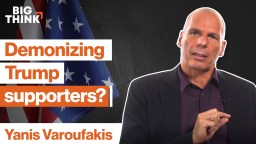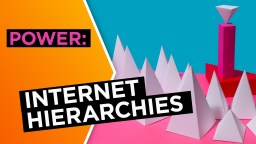JEN SCHRADIE: At the dawn of the internet, many believed that it would enable a more participatory, pluralist, and really personalized platform, particularly with politics. And it wasn't long before people were using terms like "Facebook revolution" and "Twitter revolution" to talk about how the internet could enable this more democratic way to participate in collective action. In my research, though, I wanted to, first of all, take a different tact than just looking at these very high profile movements, whether we're talking about the Arab Spring, Occupy Wall Street, or more recently the Me Too movement, and really get a more general sense of what was happening on an everyday level.
I found a political issue that attracted groups on the left and the right, because at the time when I started the research in 2011, there were a lot of celebratory reports about very left-leaning movement. So I also wanted to look at conservative groups. And what I found was a very profound digital activism gap. Groups that were more middle to upper class, groups therefore with more resources, but also more organizational infrastructure, more hierarchy, were much more likely to be online. I also found that those groups tended to be more right-leaning or conservative. And it wasn't just these questions around resources and structure, it was also conservatives tended to have a more ideological inclination, more of a motivation to use the internet than groups on the left.
North Carolina really appealed to my methodological inclinations, to be quite honest, because it did really have this far left, far right, and really center political spectrum, Obama won the state in 2008 by a hair. He lost the state, also by a very small margin, in 2012. And this state was really hovering between left and right. So I decided to pick this issue around collective bargaining rights for public employees, because it did attract both these conservative groups, as well as these left-leaning groups. And as a result, I looked at about 34 different organizations that had been politically active on this issue. And they varied on the left side to support labor rights from labor unions, which you would expect, worker centers, but also civil rights groups, the North Carolina NAACP, a student group, and other groups, as well. Because this issue really operated more like a social movement than a traditional labor issue, largely because unions in North Carolina are extremely marginalized. At the time, it had the lowest rate of unionization in the country, and it still hovers at the bottom. But on the other hand, there were Tea Party groups, other patriot groups, like Preppers, and other conservative organizations which were very much opposed to any kind of union issue, especially around public employees. Because for conservatives, the whole idea of public employees really represented government, particularly, big government, which they were opposed to.
And what I found by looking at what -- not only how much they were engaged online, but what they were saying online, that conservatives were really focused on this question of freedom. And government got in the way of this quest for freedom. The internet, however, was an ideal vehicle for this idea of freedom. Freedom from the state, free markets, and for them, freedom of information, as well. Because they really believed that the mainstream media was not accurately covering their issues, or really covering their -- what they were doing with their activism on the right. And in fact, I think in many ways when we think about these so-called filter bubbles online, that they were right, that the left, as well as the mainstream media, really wasn't paying that much attention to what was going on with conservatives. So Trump's victory, I think, was a surprise to many. But as a scholar who had been studying what was going on on the grassroots level, as well as online, I was not as surprised. However, groups on the left, rather than focus on freedom, they were focused more on this question of fairness and around equity, labor rights, wages, et cetera.
Now, this question of fairness allowed for a wide variety of groups to be involved and engaged. As I mentioned, civil rights groups, labor groups, and also when they would post online, they didn't have as straight forward a message as groups on the right. So for them, that partially drove why they were not online as much, and why their messages didn't resonate and weren't retweeted and reposted as much, right? Because such a wide variety of issues, in general, among the left, whether it's LGBTQ issues, labor issues, civil rights issues, women's rights issues, voting rights, they really are a way that this idea of fairness could really be summed up. But wasn't this pithy, straightforward message around freedom that the right not only was retweeting comments or posts that they created, but also articles by conservative media, and also memes. Conservatives were really strong on visual posts, as well, which really worked very, very well. And so this informationalizing on the right compared to organizing on the left really helps explain this ideological gap that I found. People on the left were interested in the internet and definitely used it for their organizing. But even students, who you would think would be at the leading force of digital technology, just saw it as one of many organizing tools. That this particular student group was really interested -- it was horizontally run -- really interested in a wide variety of people participating. And for them, the internet wasn't necessarily a great way to have democratic decision-making and participation. It was one tool to help organize people. But it wasn't what one conservative activist told me, which is that for them, Paul Revere had a horse, but they had the internet.





